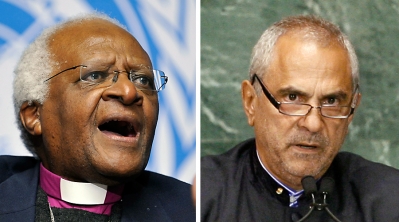Source: www.huffingtonpost.com
By Desmons Tutu, José Ramos-Horta

The forward progress of humankind in the last centuries has been fueled, more than any other factor, by increasing access to information, more rapid exchange of ideas, and in most parts of the world, universal education.
Freedom of education and freedom of information are integral to freedom of thought. Few advances have been made for humankind which were not preceded by new ways of looking at our world and new schools of thought.
So it is particularly shocking when despots and dictators in the twenty-first century attempt to subjugate their own populations by attempting to deny education or information to their people.
Not only is it futile in the long term, it makes them appear fearful of the very age they live in, and haunted by the new thinkers in their midst.
Perhaps the most glaring example of this fear today is the denial of higher education to the members of the Baha’i Faith in Iran — a peaceful religion with no political agenda, which recognizes the unity of all religions.
In 1987, after being barred by their government from Iranian universities because of their faith, the resourceful Baha’i community in Iran organized the Baha’i Institute for Higher Learning, a
decentralized network of teachers delivering college level classes in kitchens and living rooms across Iran. Baha’i professors and administrators who had also been banned from their universities for their faith were joined by courageous Muslim academics who would risk their careers and even imprisonment to support the network and teach the youth.
Taught by accredited professors, the quality of the coursework has been recognized and accepted for credit by more than fifty universities outside of Iran, allowing the BIHE students to continue with graduate work abroad. This creative solution has lifted the lives of thousands of Baha’i students who would otherwise have been denied meaningful careers.
On May 21, 2011, the BIHE came under attack when Iranian officials raided thirty Baha’i homes and arrested over a dozen of its teachers and administrators. Those arrested were neither political nor religious leaders. They were lecturers in subjects that included accounting and dentistry, who today face the prospect of decades in prison. The crime with which they are charged – delivering higher education to Baha’i youth.
The suppression of education in Iran is not limited to those of the Baha’i Faith. Other Iranian youth have been expelled from universities for their beliefs or for holding viewpoints determined to be counter to the ruling party, including pro-reform views. Iranian officials have forbidden new delivery of and are in the process of rewriting the course content of twelve social sciences on the university curricula — including law, philosophy, management and political science – to make them more closely align with their own interpretation of the Islamic faith. They have stated that up to 70% of the course content in the social science will be rewritten by government officials.
We believe it is important to recognize that these actions are neither the result of or dictated by the Islamic faith. One need only look at the Dark Ages of Europe or the Spanish Inquisition to see that Iranian Ayatollahs are certainly not the first to use religion as the cloak to attempt to forcibly suppress ideas and knowledge that they fear could threaten their power. The rich philosophical and artistic Iranian traditions, the contributions of Iranian scholars worldwide, and the actions of the Muslim community members who have aided and supported the BIHE, are testament to the fact that the actions of their leaders are no reflection of the Muslim faith or the many good-willed Muslims in Iranian communities.
And while we believe that both historically and in today’s “wired” world it is futile to suppress the quest for knowledge, there are many in Iran whose lives are being threatened or damaged by the attempt.
They need our support.
We call on the international academic community to come to the aid of those whose lives are being subjected to these oppressive laws.
Specifically we, the undersigned, ask that the international academic community:
1. Call on the government of the Iranian Republic to release unconditionally and drop charges against the BIHE educators currently under arrest and facing charges related to their educational activities.
2. As academic leaders, administrators and professors, register through any possible channels in the Iranian academic community their disagreement with and disapproval of any policy which would bar individuals from higher education based on their religious background or political persuasion, or which would remove or corrupt any established fields of study from a university curricula for religious or political reasons.
3. Encourage their own universities to review the educational quality of the BIHE coursework for possible acceptance of its credits, so that those who have had the benefit of its programs can continue at higher levels of study.
4. As possible, offer available online university level curricula, through scholarships if needed, to students in Iran who would otherwise be deprived of the right to higher education or who, due to government limitation on social sciences, would not have a full array of educational options available to them in their own county.
Thank you for your support.
And please also watch this video.
With warm regards,
Archbishop Desmond M. Tutu, O.M.S.G, D.D., F.K.C.
Anglican Archbishop Emeritus of Cape Town
1984 Nobel Peace Prize recipient
President José Ramos-Horta
President of East Timor
1996 Nobel Peace Prize recipient
Leave a Reply